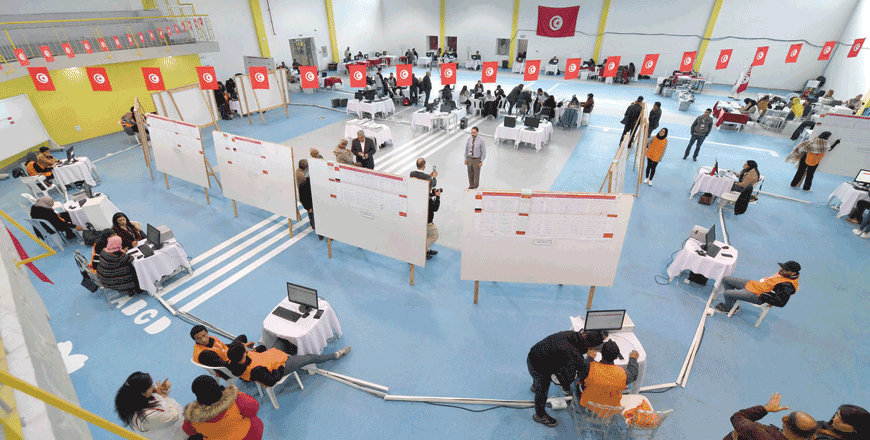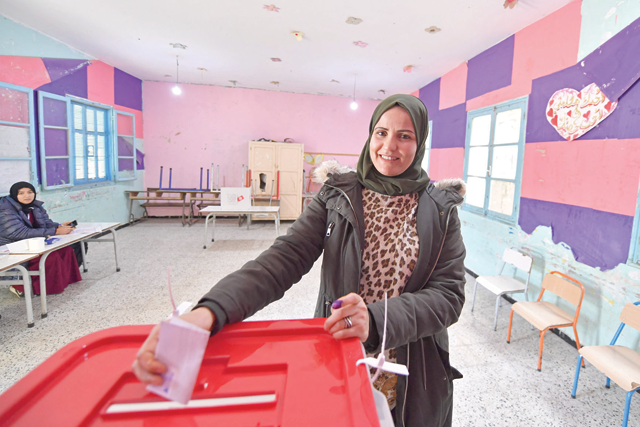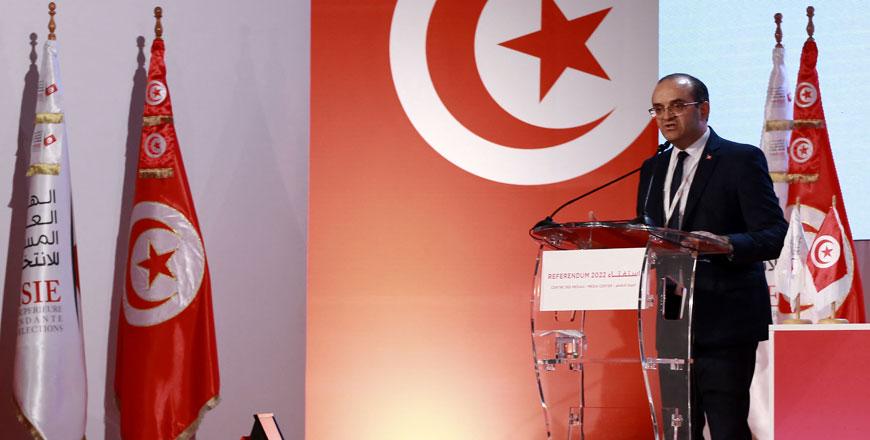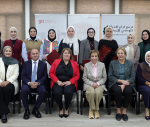You are here
Tunisia opposition calls for Saied to quit after voters shun election
By AFP - Dec 18,2022 - Last updated at Dec 18,2022

Members of the Tunisian electoral commission count votes on Sunday in Tunis (AFP photo)
TUNIS — Tunisia plunged into political uncertainty on Sunday as its main opposition alliance called on President Kais Saied to "leave immediately", a day after voters overwhelming snubbed elections for a neutered parliament.
That comes with Saied's government negotiating a nearly $2-billion package to bail out the North African country's crippled public finances.
Ahmed Nejib Chebbi, president of the National Salvation Front alliance, said Saied had “lost all legal legitimacy”.
The electoral board said 8.8 per cent of the 9-million-strong electorate had turned out for Saturday’s polls, the culmination of a power grab by Saied in the only democracy to have emerged from the Arab Spring.
An abstention rate of more than 91 per cent “shows that very, very few Tunisians support Kais Saied’s approach”, Chebbi told AFP by telephone.
He said the result showed “great popular disavowal” of the process that began when Saied, elected in 2019, seized executive powers last year.
The president in July 2021 sacked the government, froze parliament and surrounded it with military vehicles, following months of political deadlock and economic crisis exacerbated by the coronavirus pandemic.
Saied, a former law professor, followed up by seizing control of the judiciary and pushing through a constitution that consolidated his near-absolute power in a widely boycotted referendum in July.
His moves, a decade after the ouster of dictator Zine Al Abidine Ben Ali, have sparked fears of a return to autocracy.
The National Salvation Front, which includes Saied’s nemesis the Islamist-inspired Ennahdha Party, boycotted Saturday’s election, saying it was part of a “coup” against Tunisia’s democracy.
“Today the situation is critical. We should agree on a high-ranking judge to oversee immediate presidential elections,” Chebbi said.
A presidential decree earlier this year gave Saied the power to fire judges, and he sacked 57 of them but an administrative court in August revoked most of those firings.
Chebbi said his bloc would reach out to “all social and political actors” in the coming days.
“Tunisians were shaken yesterday. I hope that will push them towards talking to each other and agreeing on an urgent solution,” Chebbi said.
‘Draconian conditions’
The ballot for the new 161-seat assembly followed three weeks of barely noticeable campaigning, with few posters in the streets and no serious debate among a public preoccupied with day-to-day economic survival.
Saied’s moves were initially supported by some Tunisians tired of the messy and sometimes corrupt democratic system installed after the revolution.
But almost a year and half on, the country’s economic woes have gone from bad to worse and inflation is higher than Saturday’s voter turnout.
Political analyst Salaheddine Jourchi said Saturday’s “shock” low turnout had left Saied “more isolated, from the elite, the parties and now the people too”.
“This turnout, the lowest ever recorded, shows that the people have no trust” in Saied, he said.
The previous legislature, dominated by Ennahdha, had far-reaching powers in the mixed presidential-parliamentary system enshrined in Tunisia’s post-revolution constitution.
But the new chamber “won’t be able to appoint a government or censure it, except under draconian conditions that are almost impossible to meet”, according to political scientist Hamadi Redissi.
Candidates were required to stand as individuals, in a system that neuters political parties.
Hamza Meddeb, a fellow at the Carnegie Middle East Centre, said the election was a “formality to complete the political system imposed by Kais Saied and concentrate power in his hands”.
Related Articles
TUNIS — Tunisia's main opposition coalition pressed the government on Monday to explain a days-long public "absence" of President Kais Saied
TUNIS — Tunisians voted in a lacklustre election on Saturday for a parliament with virtually no power, the final pillar in President Kais Sa
TUNIS — Tunisia has approved a new constitution granting unchecked powers to the office of President Kais Saied, the electoral board said, a


















